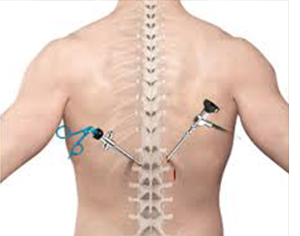
The goal of the minimally invasive spine (MIS) surgery is to stabilize the vertebral bones as well as the spinal joints and relieve pressure which is being applied to the spinal nerves often as a result of conditions such as spinal instability, bone spurs, herniated discs, scoliosis or spinal tumors. These approaches can be faster, safer and require less recovery time as compared to open surgery because of the reduced trauma to the muscles and soft tissues (compared to open procedures).
During MISS, the surgeon makes a smaller incision and then inserts a device called a tubular retractor, which is a stiff, tube-shaped tool. It creates a tunnel to the problem area of the spine. It gently pushes aside the muscle and soft tissue around the area. The surgeon can then put small tools through the tunnel to work on the spine. The surgeon also uses a special operating microscope and views real-time X-ray images of the spine.
BENEFITS OF MINIMALLY INVASIVE SPINE SURGERY
Eligibility for Minimally Invasive Spine Surgery
Spine surgery is recommended by Surgeons only if the patient has the following conditions:
How long is the average recovery period after an outpatient MISS procedure?
Some procedures can be performed as an outpatient procedure, including disc herniations and patients are typically discharged within two to three hours after surgery.
How long is the average recovery period after an inpatient MISS procedure?
The average hospital stay is less than two days, and most patients can return to activities within one to four weeks. Return to work varies from 1 to 3 months depending on the type of surgery and also the requirement of physical activity of your employment.
Will there be any postoperative pain?
Postoperative pain is easily managed in most patients with oral medication.
What is meant by spinal instability or spondylolisthesis?
Spinal instability refers to the excessive movement between two vertebrae resulting in a misalignment of the vertebrae. This misalignment is called spondylolisthesis.
What does lumbar or spinal instrumentation mean?
It refers to the use of titanium screws and rods to surgically stabilize an unstable segment of the spine and promote fusion of the affected vertebrae.
If I have a fusion why do I need rods and screws in my spine?
Screws and rods in the spine serve the same purpose as a cast on a broken arm or leg. They maintain constant contact between the vertebrae and the bone grafts to promote the fusing together of the vertebrae.
Can I feel the rods and screws after surgery?
Only an extremely slender patient with small back muscles might be able to feel the heads of the screws.
Do the rods and screws need to be removed?
No. As long as solid fusion occurs after surgery, the rods and screws will remain in place.
How long is the average recovery period after an outpatient MISS procedure?
Some procedures can be performed as an outpatient procedure, including disc herniations and patients are typically discharged within two to three hours after surgery.
How long is the average recovery period after an inpatient MISS procedure?
The average hospital stay is less than two days, and most patients can return to activities within one to four weeks. Return to work varies from 1 to 3 months depending on the type of surgery and also the requirement of physical activity of your employment.
Will there be any postoperative pain?
Postoperative pain is easily managed in most patients with oral medication.
What is meant by spinal instability or spondylolisthesis?
Spinal instability refers to the excessive movement between two vertebrae resulting in a misalignment of the vertebrae. This misalignment is called spondylolisthesis.
What does lumbar or spinal instrumentation mean?
It refers to the use of titanium screws and rods to surgically stabilize an unstable segment of the spine and promote fusion of the affected vertebrae.
If I have a fusion why do I need rods and screws in my spine?
Screws and rods in the spine serve the same purpose as a cast on a broken arm or leg. They maintain constant contact between the vertebrae and the bone grafts to promote the fusing together of the vertebrae.
Can I feel the rods and screws after surgery?
Only an extremely slender patient with small back muscles might be able to feel the heads of the screws.
Do the rods and screws need to be removed?
No. As long as solid fusion occurs after surgery, the rods and screws will remain in place.

Rating :

In 1990, Amandeep Group was established by Dr. Amandeep Kaur & Dr. Avtar Singh as Amandeep Hospital a 5 bedded specialty center for Orthopedics & Trauma management. What started as an institution to serve the needy today is res.....

Rating :
With a strong belief of ‘giving back to the country’, BR Life is a leading healthcare services brand owned by Dr. BR Shetty. Under the banner of BR Life, we have super specialty healthcare facilities in India, Nepal and E.....

Rating :
Vedic Sutra—A first of its kind Techno-Ayurveda centre was founded by doctor Anu Jaiswal to provide Therapies based on the unison of Technology with Ayurveda for curing the Ailments of Body.....

Rating :
Meraki Multi-Specialty Dental Studio is a state of the art facility with well-qualified dentists who believe in continued education and utilizing world’s latest technologies and procedures to offer unprecedented service and car.....
Rating :
Rating :
Hospital Profile Description Currently Not Available







The goal of the minimally invasive spine (MIS) surgery is to stabilize the vertebral bones as well as the spinal joints and relieve pressure which is being applied to the spinal nerves often as a result of conditions such as spinal instability, bone spurs, herniated discs, scoliosis or spinal tumors. These approaches can be faster, safer and require less recovery time as compared to open surgery because of the reduced trauma to the muscles and soft tissues (compared to open procedures).
During MISS, the surgeon makes a smaller incision and then inserts a device called a tubular retractor, which is a stiff, tube-shaped tool. It creates a tunnel to the problem area of the spine. It gently pushes aside the muscle and soft tissue around the area. The surgeon can then put small tools through the tunnel to work on the spine. The surgeon also uses a special operating microscope and views real-time X-ray images of the spine.
BENEFITS OF MINIMALLY INVASIVE SPINE SURGERY
Eligibility for Minimally Invasive Spine Surgery
Spine surgery is recommended by Surgeons only if the patient has the following conditions:
How long is the average recovery period after an outpatient MISS procedure?
Some procedures can be performed as an outpatient procedure, including disc herniations and patients are typically discharged within two to three hours after surgery.
How long is the average recovery period after an inpatient MISS procedure?
The average hospital stay is less than two days, and most patients can return to activities within one to four weeks. Return to work varies from 1 to 3 months depending on the type of surgery and also the requirement of physical activity of your employment.
Will there be any postoperative pain?
Postoperative pain is easily managed in most patients with oral medication.
What is meant by spinal instability or spondylolisthesis?
Spinal instability refers to the excessive movement between two vertebrae resulting in a misalignment of the vertebrae. This misalignment is called spondylolisthesis.
What does lumbar or spinal instrumentation mean?
It refers to the use of titanium screws and rods to surgically stabilize an unstable segment of the spine and promote fusion of the affected vertebrae.
If I have a fusion why do I need rods and screws in my spine?
Screws and rods in the spine serve the same purpose as a cast on a broken arm or leg. They maintain constant contact between the vertebrae and the bone grafts to promote the fusing together of the vertebrae.
Can I feel the rods and screws after surgery?
Only an extremely slender patient with small back muscles might be able to feel the heads of the screws.
Do the rods and screws need to be removed?
No. As long as solid fusion occurs after surgery, the rods and screws will remain in place.

Rating :

In 1990, Amandeep Group was established by Dr. Amandeep Kaur & Dr. Avtar Singh as Amandeep Hospital a 5 bedded specialty center for Orthopedics & Trauma management. What started as an institution to serve the needy today is res.....

Rating :
With a strong belief of ‘giving back to the country’, BR Life is a leading healthcare services brand owned by Dr. BR Shetty. Under the banner of BR Life, we have super specialty healthcare facilities in India, Nepal and E.....

Rating :
Vedic Sutra—A first of its kind Techno-Ayurveda centre was founded by doctor Anu Jaiswal to provide Therapies based on the unison of Technology with Ayurveda for curing the Ailments of Body.....

Rating :
Meraki Multi-Specialty Dental Studio is a state of the art facility with well-qualified dentists who believe in continued education and utilizing world’s latest technologies and procedures to offer unprecedented service and car.....
Rating :
Rating :
Hospital Profile Description Currently Not Available






Not Available
Medtravels ensures bridging the gap and providing accessibility for patients to interact directly with healthcare service providers. We remain committed to connecting all stakeholders across geographies, and focusing on taking Healthcare beyond boundaries.

We are one of the first few organizations in India to be NABH certified. This itself speaks out loud about the services and facilities we provide to our clients while ensuring optimum quality at all aspects.

We ensure to bring you the best in terms of both healthcare quality & affordability. We value our customers so providing the best of services to them at an affordable price is our objective.

We understand that getting the first opinion is the most crucial step towards your healthcare journey and so based on your reports, we provide you consultation(s) or opinion(s) from top-notch doctors & consultants without any charges.

Travelling outside your home country can be a rigorous affair. So, here we are, to guide you through all the necessities such as – Medical Visa, Air Bookings, Accommodation, Air Ambulance, Pharmacy, Medical Loan, Leisure Travel.

We constantly strive to provide our clients with maximum options and so we have global coverage in terms of Healthcare Providers. We provide you hospital options from – INDIA, SINGAPORE, THAILAND, MALAYSIA, TURKEY & the list goes on

Our objective is to work with complete transparency with both our partners & clients. With this motto, we maintain not to charge you for anything. When you come for treatment, you pay the hospital directly.
Not Available